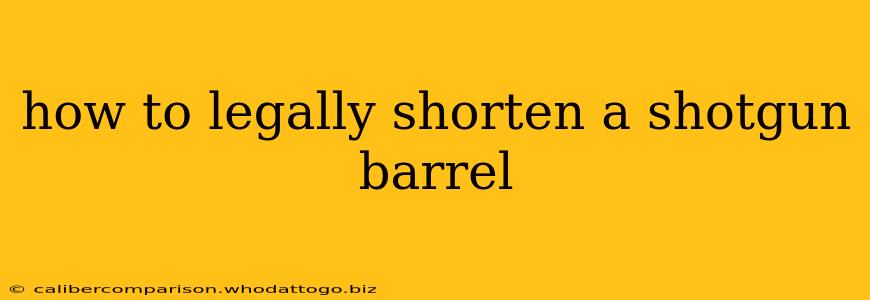Shortening a shotgun barrel can significantly alter its performance and legal standing. This guide provides crucial information on the legal aspects and processes involved, emphasizing the importance of adhering to all applicable federal, state, and local regulations. It is crucial to understand that improper modification can lead to serious legal consequences, including hefty fines and imprisonment. This information is for educational purposes only and does not constitute legal advice. Always consult with a qualified firearms attorney and your local law enforcement agencies before undertaking any modifications to your firearm.
Understanding the Legal Framework
Federal law, specifically the National Firearms Act (NFA), governs the modification of firearms, including shotguns. The NFA regulates the length of shotgun barrels, and reducing a barrel below the legal minimum can lead to serious legal repercussions. The minimum legal length for a shotgun barrel is generally 18 inches. However, this is a federal minimum, and some states may have even stricter regulations. It's critical to research your specific state and local laws regarding shotgun barrel length.
Additionally, the overall length of the firearm (barrel plus receiver) must also meet legal requirements. This overall length, often referred to as the Overall Length (OAL), typically needs to be at least 26 inches. This regulation is in place to prevent the creation of easily concealable weapons.
State and Local Laws: A Crucial Consideration
Federal law provides a baseline, but state and local laws can impose stricter requirements. Some jurisdictions may have ordinances that prohibit the shortening of shotgun barrels altogether, regardless of the final length. Always check your state's and your city or county's laws before even considering modifying your shotgun. This information is readily available online through official government websites. Don't rely on hearsay; confirm the regulations directly from the source.
The Process (If Legally Permissible)
If, after thorough research, you determine that shortening your shotgun barrel is legally permissible in your jurisdiction, the process itself requires specialized tools and expertise. This is not a DIY project. Improper shortening can result in an unsafe firearm and potentially lead to injury or death.
The process typically involves:
- Precise Measurement and Marking: Accurate measurements are vital to ensure the barrel is shortened to the legal minimum length.
- Cutting the Barrel: This requires specialized tools and precision to create a clean, straight cut.
- Crown Work: The end of the barrel must be carefully crowned (shaped) to ensure proper function and accuracy. This step is crucial for safety and prevents damage to the barrel.
- Headspace Checking: After modification, a gunsmith must check the headspace to ensure the shotgun functions safely. Improper headspace can cause catastrophic failure.
Finding a Qualified Gunsmith
Never attempt to shorten a shotgun barrel yourself. This is a specialized task that requires significant skill and experience. Employing a qualified gunsmith is essential to ensure the modification is done safely and legally. A reputable gunsmith will be familiar with all the relevant regulations and can perform the work correctly. Seek recommendations from other firearm enthusiasts or check online reviews to find a trusted professional.
Consequences of Illegal Modification
Modifying a shotgun barrel illegally can result in severe penalties. These penalties can include:
- Fines: Significant monetary fines.
- Imprisonment: Jail time.
- Forfeiture of the firearm: The modified shotgun may be confiscated by law enforcement.
- Felony charges: In some cases, illegal firearm modification can lead to felony charges.
This guide highlights the crucial aspects of legally shortening a shotgun barrel. Remember: safety and legality are paramount. Always prioritize compliance with all applicable laws and seek professional assistance. The information provided here is for educational purposes only and should not be interpreted as legal advice. Consult with a qualified attorney and law enforcement to ensure compliance with all applicable regulations.

